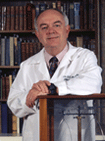Julius Axelrod Award

Brian K. Kobilka, MD
Stanford University
Brian K. Kobilka, M.D. has been named the recipient of the 2010 ASPET-Julius Axelrod Award in Pharmacology by the American Society for Pharmacology and Experimental Therapeutics (ASPET). Dr. Kobilka is Professor of Medicine and Molecular and Cellular Physiology at Stanford University School of Medicine. The Julius Axelrod Award is given to recognize outstanding scientific contributions in research and mentoring. The Award was established to honor the memory of the eminent American pharmacologist who shaped the fields of neuroscience, drug metabolism and biochemistry.
Dr. Kobilka received a bachelor’s degree in biology and chemistry from the University of Minnesota in Duluth and earned his M.D. from Yale University School of Medicine. Following his residency in internal medicine at Barnes Hospital, University of Washington School of Medicine in St. Louis, Dr. Kobilka moved to Duke University as a postdoctoral fellow and then to Stanford.
He is known for his innovative research on the structure and activity of G protein-coupled receptors, and his laboratory has obtained the crystal structures of the human beta-2 adrenergic receptor. These were the first high-resolution structures for a GPCR activated by a diffusible hormone or neurotransmitter. This work has been highly cited because GPCRs are important targets for pharmaceutical therapeutics but difficult to work with in x-ray crystallography. His GPCR structure work was named “runner up” for the 2007 “Breakthrough of the Year” award from Science. Dr. Kobilka’s academic honors include the 1994 John Jacob Abel Award, which is also sponsored by ASPET, and a 2004 Javits Investigator Award from the National Institutes of Health.
An accomplished mentor, Dr. Kobilka has trained a multitude of graduate students and postdoctoral fellows who have gone on to prominent careers in industry and academia. His excitement for science has motivated many others and the breadth of his knowledge challenges trainees and colleagues alike to work to achieve the degree of scholarship and determination that has been the hallmark of Dr. Kobilka’s career. Dr. Kobilka will deliver the Julius Axelrod Lecture at the 2011 Experimental Biology Meeting.
John Jacob Abel Award

Russell A. DeBose-Boyd, PhD
University of Texas Southwestern Medical Center
Dr. Russell DeBose-Boyd, Associate Professor in the Department of Molecular Genetics at the University of Texas Southwestern Medical Center is the recipient of the 2010 John J. Abel Award, sponsored by Eli Lilly & Co. The Award is given to a single young investigator for original, outstanding research contributions in the field of pharmacology. Dr. DeBose-Boyd has made key contributions to our understanding of how cholesterol homeostasis is regulated. These studies have direct and far reaching implications for the discovery of new drugs to lower cholesterol as a means to prevent coronary artery disease.
Dr. DeBose-Boyd was accepted into the Minority Biomedical Research Support program at Southeastern Oklahoma State University where he graduated with a B.S. in Chemistry. He earned his Ph.D. in Biochemistry and Molecular Biology from the University of Oklahoma Health Sciences Center. Dr. DeBose-Boyd then became a Fellow of the Jane Coffin Childs Memorial fund with Drs. Michael Brown and Joseph Goldstein at the University of Texas Southwestern Medical Center. Following post-doctoral research he was named an instructor and subsequently an Assistant Professor in the Department of Molecular Genetics at the University of Texas Southwestern Medical Center. As member of the faculty at UT Southwestern, Dr. DeBose-Boyd has received an NIH mentored Minority Faculty Development Award and became an Established Investigator of the American Heart Association. He received the W.M. Keck Foundation Distinguished Young Scholar in Medical Research Award and was named a Howard Hughes Medical Institute Early Career Scientist to support his efforts in understanding the regulation of the enzyme HMG CoA reductase, a key player in cholesterol synthesis and the target of cholesterol-lowering drugs.
Pharmacia-ASPET Award for Experimental Therapeutics

Garrett FitzGerald, MD
University of Pennsylvania
Garret FitzGerald, MD, the McNeil Professor in Translational Medicine and Therapeutics at the University of Pennsylvania, is the recipient of the 2010 Pharmacia-ASPET Award for Experimental Therapeutics. The Pharmacia-ASPET Award for Experimental Therapeutics is given annually to recognize and stimulate outstanding research in pharmacology and experimental therapeutics—basic laboratory or clinical research that has had, or potentially will have, a major impact on the pharmacological treatment of disease. This award is funded by an endowment from Pharmacia (now Pfizer) and by ASPET.
Dr. FitzGerald is internationally renowned for his work on bioactive lipids and prostaglandins, particularly on their synthetic enzymes, their products and inhibitors, and their receptors. His discoveries have contributed in a fundamental way to the adoption of low dose aspirin for cardio-protection and more recently have refined our use of nonsteroidal anti-inflammatory drugs, including those selective for Cox-2. He was the first to characterize the molecular clock in the cardiovascular system.
Dr. FitzGerald trained in medicine in University College in Dublin, Ireland. Following fellowships at the Royal Postgraduate Medical School in London, the Max Planck Institute in Cologne and at Vanderbilt where he joined the faculty and would eventually lead the Division of Clinical Pharmacology, Dr. FitzGerald moved back to University College in Dublin for several years to chair the Department of Medicine and Therapeutics before returning to the United States. He then directed the Center for Experimental Therapeutics and the General Clinical Research Center as the Robinette Professor of Cardiovascular Medicine at the University of Pennsylvania. Subsequently, he became a Chair of the Department of Pharmacology at Penn and the Director of the Institute of Translational Medicine and Therapeutics. Dr. FitzGerald’s work has had a high impact, attracting more than 30,000 citations. He has been awarded honorary degrees from University College, Dublin and the Universities of Edinburgh and Frankfurt. Dr. FitzGerald also serves on the Peer Review Advisory Committee of the NIH, the Science Board of the FDA and the Drug Forum of the Institute of Medicine.
The Goodman and Gilman Award in Receptor Pharmacology
 Alan R. Saltiel, PhD
Alan R. Saltiel, PhD
University of Michigan
Dr. Alan Saltiel, Director of the Life Sciences Institute and John Jacob Abel Professor of Internal Medicine and Molecular and Integrative Physiology at the University of Michigan, is recipient of the 2010 ASPET Goodman and Gillman Award. The biennial Award, funded by GlaxoSmithKline, was established to recognize and stimulate outstanding research in pharmacology of biological receptors. Such research might provide a better understanding of the mechanisms of biological processes and potentially provide the basis for the discovery of drugs useful in the treatment of diseases.
Dr. Saltiel received his undergraduate degree from Duke University and a Ph.D. in Biochemistry from the University of North Carolina. Following a post-doctoral fellowship at Wellcome Research Laboratories, he moved to Rockefeller University as Assistant Professor. He would join Parke Davis Pharmaceutical Research as Director of Signal Transduction where he would become Distinguished Research Fellow and Senior Director of Cell Biology at Parke Davis. Dr. Saltiel moved to Michigan in 2001 at the newly created Life Sciences Institute at Michigan as Professor of Medicine and Physiology. He was named Director of the Institute the following year.
Dr. Saltiel has been a leader in the fields of signal transduction, receptor biology, vesicle trafficking and drug discovery for over 25 years. He has made significant contributions to understanding the cellular actions of hormones and growth factors that have led to new therapeutic approaches to human disease. His studies have demonstrated that spatial compartmentalization of signaling from cell surface receptors was a key determinant of specificity, paving the way for current studies in many labs that are now exploring its importance in diabetes and insulin resistance. Dr. Saltiel was ranked number 18 among most highly cited authors in biology and biochemistry over the past ten years. He is a past recipient of the John Jacob Abel Award from ASPET, was elected to honorary membership in the American Society of Clinical Investigation, is a fellow of the AAAS, and is a member of the Institute of Medicine of the National Academy of Sciences.
The Bernard B. Brodie Award in Drug Metabolism
 James R. Halpert, PhD
James R. Halpert, PhD
University of California, San Diego
James R. Halpert, Ph.D., of the University of California at San Diego is the recipient of the 2010 Bernard B. Brodie Award based on his tremendous impact on the field of drug metabolism. The Brodie Award recognizes Dr. Halpert’s outstanding contributions to our understanding of human drug metabolism and to future research in the field. His research over the last 30 years has focused on cytochrome P450 structure and function. His contributions have had lasting impact on the way drug metabolism science is conducted and how we think about P450 structure and function.
Beyond his scientific achievements, Dr. Halpert has contributed greatly as an educator and leader in the field of drug metabolism. He is currently President-elect of ASPET, served as its Treasurer and Chair of the ASPET Drug Metabolism Division, and served for five years as Editor of Drug Metabolism and Disposition. In 2006 he received the Distinguished Faculty Research Award from the Graduate School at UTMB and was named a Fellow of the American Association for the Advancement of Science.
Trained as a non-scientist during his undergraduate years, Dr. Halpert earned his B.A. in Scandinavian Languages from UCLA. He earned his Ph.D. in Biochemistry from Uppsala University in Sweden and an M.S. in Toxicology from the Karolinska Institute. After a year of post-doctoral training at Vanderbilt he moved to the University of Arizona where he would become full Professor. In 1998, Dr. Halpert became Chair of the Department of Pharmacology and Toxicology at the University of Texas Medical Branch in Galveston, Texas. He has served as Foreign Adjunct Professor at the Karolinska Institute and is currently Professor and Associate Dean for Scientific Affairs in the Skaggs School of Pharmacy and Pharmaceutical Sciences and Professor of Pharmacology at the University of California, San Diego.
His lecture, entitled, "Structure and Function of Cytochromes P450 2B and 3A: From Mechanism-based Inactivators to X-ray Crystal Structures and Back," will be given at 2:00 pm on Monday April 26, in Room 208 of the Anaheim Convention Center.
The P.B. Dews Lifetime Achievement Award in Behavioral Pharmacology

Donald E. McMillan, PhD
University of Arkansas for Medical Sciences
Donald E. McMillan, Professor Emeritus, Department of Pharmacology & Toxicology at the University of Arkansas for Medical Sciences is the winner of the 2010 P.B. Dews Lifetime Achievement Award in Behavioral Pharmacology. The award is given in alternate years and honors the fundamental contributions of P.B. Dews to behavioral pharmacology. Dr. McMillan’s many contributions to behavioral pharmacology built and expanded upon the many intellectual foundations laid by Peter B. Dews and the broader field of behavioral pharmacology.
With over 200 peer-reviewed papers, Dr. McMillan’s prolific scientific contributions in the areas of behavioral pharmacology have focused on the role of the schedule reinforcement as a determinant of the effect of drugs on behavior. His research has played a key role in establishing oral self-administration models in laboratory animals. Dr. McMillan’s research on the effects of neurotoxicants on schedule-controlled behavior are often cited.
Dr. McMillan earned his M.S. and Ph.D. in psychology at the University of Pittsburgh. His postdoctoral fellowship was at Harvard Medical School under the direction of Peter Dews and Bill Morse. Following a teaching and research position at Downstate Medical Center, State University of New York, he moved to the University of North Carolina where he would become Full Professor. In 1978, he left Chapel Hill to assume the Chair of the Department of Pharmacology at the University of Arkansas for Medical Sciences (UAMS). He assumed a secondary appointment as Professor of Psychiatry and as the Wilbur Mills Professor of Alcoholism and Drug Abuse Prevention, became the first endowed Chair to be awarded to a basic scientist in the history of the Medical School. Subsequently Dr. McMillan founded and became Director of the Substance Abuse Treatment Clinic of UAMS. He was selected as the first recipient of the Distinguished Faculty Lectureship from UAMS for his accomplishments in academic medicine and has received several teaching awards from medical students while at UAMS. Dr. McMillan was also recipient of the Nyswander-Dole Award from the American Methadone Treatment Association in 2000.
His lecture, entitled "Staying On Schedule," will be given at 2:00 pm on Sunday, April 25, 2010, in Room 210C on the Anaheim Convention Center.
ASPET Astellas Awards for Translational Pharmacology
The ASPET-Astellas Awards in Translational Pharmacology are intended to recognize pharmacological research accomplishments that seek to extend fundamental research closer to applications directed towards improving human health. The awards will be given to 1) recognize those individuals whose research has the potential to lead to the introduction of novel pharmacologic approaches or technologies that may offer significant advances in clinical medicine in the future and 2) to facilitate that translational process. The awards are made possible by a grant to ASPET from the Astellas Foundation.
 Craig W. Lindsley, PhD
Craig W. Lindsley, PhD
Vanderbilt University
Dr. Craig Lindsley, Associate Professor of Pharmacology and Chemistry at Vanderbilt University School of Medicine is a recipient of the 2010 ASPET-Astellas Award in Translational Pharmacology. The ASPET-Astellas Awards in Translational Pharmacology are intended to recognize pharmacological research accomplishments that seek to extend fundamental research closer to applications directed towards improving human health. The awards are given to 1) recognize those individuals whose research has the potential to lead to the introduction of novel pharmacologic approaches or technologies that may offer significant advances in clinical medicine in the future and 2) to facilitate that translational process.
Dr. Lindsley’s research has had a fundamental impact on pharmacology and drug discovery in the fields of neuroscience and cancer biology. While at Merck, the novel approaches that he pioneered changed the approach to medicinal chemistry throughout the company and had a major impact on virtually every therapeutic area represented by the company. He is recognized as a pioneer in the drug discovery community who brought technology-enabled synthesis to the forefront of drug discovery and medicinal chemistry. Dr. Lindsley has also been critically involved in discovery of some of the first highly selective allosteric modulators of G protein-coupled receptors. At Vanderbilt, he has been responsible for coordinating major drug discovery chemistry efforts in collaboration with major industry and patient groups.
Dr. Lindsley received his B.S. in Chemistry from the California State University at Chico and a Ph.D. from the University of California at Santa Barbara. Following his Postdoctoral Fellowship at Harvard, he moved to Parke-Davis Pharmaceuticals and then to Eli Lilly before concluding several years at Merck Research Laboratories where he would lead the Technology Enables Synthesis Group within the Medicinal Chemistry Department. Dr. Lindsley moved to Vanderbilt in 2006 as Associate Professor where he is Director of Medicinal Chemistry of the Vanderbilt Program in Drug Discovery and PI of the Vanderbilt Specialized Chemistry Center (MLPCN).
 Kenneth D. Tew, PhD
Kenneth D. Tew, PhD
Medical University of South Carolina
Dr. Kenneth Tew, the John C. West Chair in Cancer Research and the Chairman of the Department of Cell and Molecular Pharmacology at the Medical University of South Carolina is a recipient of the 2010 ASPET-Astellas Award in Translational Pharmacology. The ASPET-Astellas Awards in Translational Pharmacology are intended to recognize pharmacological research accomplishments that seek to extend fundamental research closer to applications directed towards improving human health. The awards are given to 1) recognize those individuals whose research has the potential to lead to the introduction of novel pharmacologic approaches or technologies that may offer significant advances in clinical medicine in the future and 2) to facilitate that translational process.
Dr. Tew has contributed significantly to a number of fields linking redox homeostasis with the discovery and design of novel anticancer agents. He is an internationally recognized investigator in the molecular pharmacology of cancer drugs. In his past and current research there is a strong emphasis on developing new cancer drugs with a reduction-oxidation platform as the basis for translational applications and the advancement of a number of drug candidates through the FDA pipeline reflects an exceptional translational focus. Many of his published studies have found translational application and been the cornerstone for clinical treatment of cancer.
Prior to his position at the Medical University of South Carolina, Dr. Tew served as Chairman of the Department of Pharmacology at the Fox Chase Cancer Center and adjunct Professor of Pharmacology at the University of Pennsylvania. He was Assistant Professor of Pharmacology at Georgetown University. Dr. Tew received his undergraduate degree from the University of Wales in Swansea and graduate training in Pharmacology at the Institute for Cancer Research at the University of London, where he received his Ph.D., and later a Doctor of Science in recognition of his accomplishments in cancer research.
 Gonzalo E. Torres, PhD
Gonzalo E. Torres, PhD
University of Pittsburgh
Dr. Gonzalo Torres, Assistant Professor in the Departments of Neurobiology and Pharmacology at the University Of Pittsburgh School Of Medicine is a recipient of the 2010 ASPET-Astellas Award in Translational Pharmacology. The ASPET-Astellas Awards in Translational Pharmacology are intended to recognize pharmacological research accomplishments that seek to extend fundamental research closer to applications directed towards improving human health. The awards are given to 1) recognize those individuals whose research has the potential to lead to the introduction of novel pharmacologic approaches or technologies that may offer significant advances in clinical medicine in the future and 2) to facilitate that translational process.
A native of Chile, Dr. Torres received his Ph.D in physiology and pharmacology from St. Louis University. Following his post-doctoral research at Duke, he moved to the University of Pittsburgh. He is also Visiting Professor at the Catholic University of Valpariso, Chile.
Dr. Torres has made a number of seminal contributions to the understanding of dopamine neurotransmission, which is critical in movement and psychiatric disorders. While at Duke he identified key dopamine transporter interacting proteins and the role of oligomerization in transporter processing and function. He identified a protein-protein interaction between the dopamine transporter and a dystonia-related protein, torsinA, which plays a key role in a common and severe form of dystonia. At the University of Pittsburgh, he has continued to research the function of torsinA and study the mechanism by which the mutation in this protein results in abnormal brain function leading to dystonic movements.
At Pittsburgh, he has earned several awards, including the International Society for Neurochemistry Young Scientist Lecture Award, the National Alliance for Research on Schizophrenia and Depression Young Investigator Award and the Presidential Early Career Award for Scientists and Engineers – the highest award given by the U.S. government to a scientist during the beginning phase of their career. Dr. Torres is also very actively committed to the training and mentoring of minority students.
Paul Vanhoutte Distinguished Lectureship in Vascular Pharmacology
.tmb-thumb160.jpg?Culture=en&sfvrsn=af338bd2_1) William B. Campbell, PhD
William B. Campbell, PhD
Medical College of Wisconsin
William B. Campbell, Ph.D., Professor and Chairman of the Department of Pharmacology and Toxicology at the Medical College of Wisconsin is recipient of the 2010 Paul M. Vanhoutte Award in Vascular Pharmacology. The Award was established to recognize scientific contributions that help our understanding and appreciation of the importance of endothelial cells and vascular smooth muscle function in health and disease. Dr. Campbell receives this honor in recognition of his substantial lifelong scientific achievements and commitment to the pleiotropic roles of the endothelium, primarily its adaptive vascular mechanisms that serve vasomotion, anti-inflammation and hemostasis.
Dr. Campbell received his Ph.D. from the University of Texas Health Science Center in Dallas. After post-doctoral work and another year as an instructor at the Medical College of Wisconsin he moved to the Department of Pharmacology at the University of Texas Southwestern Medical Center where he would eventually become full Professor of Pharmacology. In 1992 he became Chair of Pharmacology at the Medical College of Wisconsin.
For the past 30 years, Dr. Campbell has been investigating the contribution of various vasoactive agents that regulate blood pressure. His studies on endothelium-derived factors that regulate blood pressure and vascular tone identified the major vasoactive metabolites of arachidonic acid that are produced by the vascular endothelium. He has consistently made major contributions in research, teaching and service to various institutions and to the scientific community in general. Dr. Campbell has received numerous awards for his research including the Research Career Development Award from the National Institutes of Health. In 2006, he received the Novartis Award for Hypertension Research, the most prestigious award in the world in the area of hypertension research. He has received the Outstanding Mentor and Teaching Award from the Medical College of Wisconsin.
His lecture is titled “Arachidonic acid metabolites as endothelium-derived hyperpolarizing factors“ and will be delivered on Monday, April 26 from 4:30-5:30 p.m.in room 210AB at the Anaheim Convention Center.
Graduate Student Travel Award Winners
Shaquria Adderley
Arya Aditya
Michelle Baladi
Subhashis Banerjee
Lokesh Bhatt
Lawrence Blume
Lauren Brignac-Huber
David Burmeister
Rebecca Burns
Sarah Burris
Calvin Chan
Benjamin Chemel
Uyen Chu
Kelly Clapp
Jasmin Dao
Min Ding
Michael Dodrill
Courtney Donica
Jennifer Dwyer
Joju George
Brianna Goldenstein
Lindsey Hamilton |
|
Ping-Chih Ho
Badr Ibrahim
Ighodaro Igbe
Ashvin Jaiswal
Sujay Kharade
Joseph Kirui
Dhaval Kolte
Courtney LaValle
Wenjun Li
Chaofan Liang
Jacky Tsz Chiu Liu
Xiaobin Liu
Jessica Lowry
Fatima Macho Sanchez-Simon
Hercules Maguma
Bharath Mani
Mitchell McGill
Merlijn Meens
Helena Mistry
Akos Nemecz
Ozhan Ocal
Nathaniel Page |
|
Deepesh Pandey
Aaron Place
Chao Qi
Yasmeen Rizvi
Matthew Rowan
Sutheera Sangsiri
Cullen Schmid
Ryan Schneider
Alia Shatanawi
Harley Syyong
Vaidehi Jatin Thanawala
Misty Thompson
Jennifer Thomson
Vaneeta Verma
Ali Vural
Chuu-Yun Wong
Alyssa Wu-Zhang
Dorothy Yamamoto
John Yamauchi
Hao Yin
Hui You
Eric Zimmerman
Mark Zimmerman |
Young Scientist Travel Award Winners
Patrick Apopa
Namandje Bumpus
Surabhi Chandra
Gregory Collins
Karin Ejendal
Amy Eppolito
Bradford Fischer
Carolina Ghanem
Brett Jennings
Biny Joseph
Fadi Khasawneh
Aik Jiang Lau |
|
Dale Lau
Tiangang Li
Tara Macey
Marion Mohl
Ya Fatou Njie-Mbye
Christopher Podlesnik
Fernanda Priviero
Rituparna Sinha Roy
Jyothi Talakad
Douglas Tilley
Yongqiang Wang |
Summer Undergraduate Research Fellowship Travel Award Winners
Diana Avery
(Mentor: William Miller, University of Cincinnati)
Lisa Becks
(Mentor: Heather Kleiner-Hancock, Louisiana State University)
Alexander Bick
(Mentor: Joey Barnett, Vanderbilt University)
TylerDuellman
(Mentor: Bruce Cuevas, Loyola University Chicago)
Robert Helsley
(Mentor: Keith Jones, University of Cincinnati)
Jacqueline Moran
(Mentor: Ron Klein, Lousiana State University)